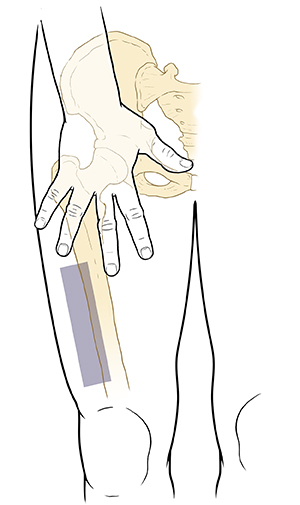Discharge Instructions: Giving Yourself an Intramuscular (IM) Injection in the Thigh
Your healthcare provider has prescribed a medicine that must be given by intramuscular (IM) injection. This means you use a needle and syringe to send medicine into large muscles in your body. They are usually given in the thigh, hip, or upper arm. If you need to give yourself injections often, you need to inject a different site on your thigh each time. This helps prevent scars and skin changes. The injection sites should be at least 1 inch from each other. Ask your healthcare provider if you need to inject the medicine in a certain site.
You were shown how to do an IM injection in the hospital. If you did not get an instruction sheet for those general steps, ask for one. This sheet is about how to give an IM injection in the thigh.
Name of your medicine:
_________________________________.
Amount per injection:
_________________________________.
Times per day:
_________________________________.
Number of days the injections will be needed:
__________________________________.
Step 1. Getting ready
-
Wash your hands well with soap and clean, running water or use an alcohol-based hand sanitizer before and after all IM injections.
-
Prepare your medicine as you were shown by your healthcare provider.
Step 2. Finding an injection site
You will map out an area of your thigh as a long rectangle. You can give yourself an IM injection in several spots inside this rectangle. To do this:
-
Place the palm of your hand against the front of your thigh where it meets your groin. (If injecting into your right thigh, use your right hand. If injecting into your left thigh, use your left hand.) The area just below your hand is the top of the rectangle.
-
Next, place your palm over the top of your knee. The area just above your hand is the bottom of the rectangle.
-
Now, imagine a line going down the middle of the front of your thigh. This is one long side of the rectangle.
-
Then, imagine there is another line along the outside of your thigh. This is the other long side of the rectangle.
-
Now, imagine there is a line down the middle of your rectangle. (This line goes straight down from your hip to your knee.) Anywhere along this line is the best place to give the injection. (See the image below.)

Step 3. Injecting the medicine
Prepare the site as you were shown by your healthcare provider. See the general instruction sheet on giving yourself an IM injection. If you did not get this sheet, ask for one. Then:
-
Stretch your skin tight.
-
Hold the syringe like a pencil. Insert the needle straight into your skin and into the muscle at a 90-degree angle.
-
You may be told by your healthcare provider to pull back slightly on the plunger. This is to make sure the needle is not in a blood vessel. If blood appears in the syringe, remove the needle and don't inject the medicine. It might go into the blood stream and not the muscle. Dispose of the needle and syringe in a sharps container and repeat the process in a different spot on your thigh.
-
To inject the medicine, push down on the plunger at a steady rate.
-
Give no more than 5 mL of medicine in this site. If the prescribed dose is more than 5 mL, you may need to split the medicine into 2 doses. You would then give 2 injections in 2 different places on your thigh.
Step 4. Removing the needle
Step 5. After the injection
-
Press a gauze pad onto the site.
-
Hold the pad tightly for a minute.
-
Check the area for redness, bleeding, or bruising.
-
Apply a bandage to the site, if needed.
-
Put the needle and syringe in a sharps container.
-
Dispose of the materials as you were shown by your healthcare provider.
-
Wash your hands well.
Medicine that comes in a container for a single dose should be used only 1 time. If you use it a second time, it may have germs that can cause infections. These infections usually affect the skin and soft tissues. But some infections can affect the brain, spinal cord, or heart. Sharing another person's used needles or medicines can cause other infections, such as hepatitis B, hepatitis C, and HIV.
Follow-up care
Follow up with your healthcare provider, or as advised.
When to get medical care
Call your healthcare provider right away if you have any of these:
-
Problems that keep you from giving yourself the injection
-
Needle that breaks off in the injection site
-
Medicine injected into the wrong area
-
Bleeding at the injection site that won’t stop
-
Severe pain, rash, or swelling at the injection site
-
Shortness of breath
-
Fever of 100.4° F ( 38°C ) or higher, or as directed by your healthcare provider
-
Chills